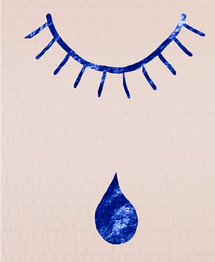 This morning as I had my usual cup of coffee on the front porch, I cried. I had been watching videos earlier in the morning, and had come across a video about a German shepherd who was a service dog for a veteran. The service dog was taking his last flight home after being diagnosed with an incurable disease, and the flight crew was honoring him on his last flight. Just thinking about it as I sipped my coffee and looked out over the fresh new day before me was almost too much to bear. I’ve had a lot of these moments lately–instances when a song, some writing on a piece of paper, or something that someone says will remind me of someone I’ve loved and lost, or will transport me back to a time that I lived, loved, and have had to let go. Almost without warning, the tears will come. and, along with them, so will the judgment and the apologies. I’m not sure when I and so many of us developed such a posture toward tears–a kind of ritual that begins with droplets of grief or joy or remembrance leaking from our eyes and ends with either self-judgment or an apology. All I know is that is what so often happens. We cry–for a reason known to us or a reason completely hidden from us, and immediately we think ourselves weak. We tell ourselves that whatever has caused us to cry is something that “happens everyday” and something we should “just get over already.” We make some binary, gendered comments like “boys don’t cry” or “girls cry over everything.” Or, we scan the group around us and decide that an apology is more appropriate. As if we are inconveniencing others with the discomfort they might feel from bearing witness to our pain. As if tears were somehow a crime against the polite company we so often try to keep. But what if I told you that tears weren’t always seen this way? Our spiritual ancestors, the Desert Mothers and Fathers, viewed tears as a gift. Something cleansing, sure, but something far deeper than “just a good cry.” In his book “Soulmaking,” author Alan M. Jones explains, “The desert tradition claims a great deal for the power of tears. Tears are agents of resurrection and transformation. It may be difficult for us to grasp the association between weeping and the bursting forth of new life. Something positive is released when tears flow. The common expression 'to have a good cry,' comes close to what is meant by the 'gift of tears;' at least it is a way of beginning to understand their liberating and cathartic effect. The 'gift of tears,' however, is concerned with something much more radical, threatening, and life-bearing than the occasional and necessary release from tension that 'having a good cry' affords. The tears of which the desert bears witness are not tears of rage, self-pity, or frustration. They are a gift, and their fruit is always joy." What if, in shutting down our tears with judgment or apologies, we are shutting down the transformation and resurrection that they can lead to? What if, out of fear of being vulnerable for a moment, we are robbing ourselves of the joy that can burst forth from our tears? What if crying is one of the ways we become more fully human, and allow those around us to do the same? What if tears aren’t weakness and grief isn’t something that we just need to get over? What if tears are the vessels that help bring us to new life? Might we then see them as something as sacramental as bread and cup? I imagine we would. So dear friends, when you need to, let the tears fall. And as they do, try to let them happen without judgment and without apology. Practice welcoming them as the gift that they are: Outward and visible signs of an internal grace that are cutting path in our hearts, our minds, and our very lives toward healing, wholeness, and new life. Learning to see the gift of tears with you, Pr. Melissa Comments are closed.
|
Rev. Melissa Sternhagen
Rev. Melissa Sternhagen was called as the pastor of St. Paul Congregational UCC in June of 2020. Prior to her call to St. Paul, Pr. Melissa worked as a hospice chaplain in the Ames, IA area, following pastorates at rural churches in Central Iowa and Southern Illinois. Pr. Melissa is a second-career pastor with a background in agribusiness and production & supply operations. She received her M.Div. from Eden Theological Seminary in St. Louis, MO, and holds a MA Ed. in Adult Education and Training, and a BA in Organizational Communications. Archives
July 2024
Categories |

 RSS Feed
RSS Feed
